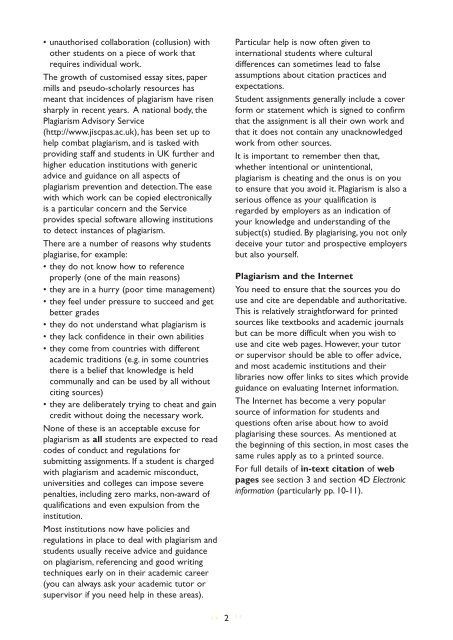Cite them right:
You also want an ePaper? Increase the reach of your titles
YUMPU automatically turns print PDFs into web optimized ePapers that Google loves.
• unauthorised collaboration (collusion) with<br />
other students on a piece of work that<br />
requires individual work.<br />
The growth of customised essay sites, paper<br />
mills and pseudo-scholarly resources has<br />
meant that incidences of plagiarism have risen<br />
sharply in recent years. A national body, the<br />
Plagiarism Advisory Service<br />
(http://www.jiscpas.ac.uk), has been set up to<br />
help combat plagiarism, and is tasked with<br />
providing staff and students in UK further and<br />
higher education institutions with generic<br />
advice and guidance on all aspects of<br />
plagiarism prevention and detection.The ease<br />
with which work can be copied electronically<br />
is a particular concern and the Service<br />
provides special software allowing institutions<br />
to detect instances of plagiarism.<br />
There are a number of reasons why students<br />
plagiarise, for example:<br />
• they do not know how to reference<br />
properly (one of the main reasons)<br />
• they are in a hurry (poor time management)<br />
• they feel under pressure to succeed and get<br />
better grades<br />
• they do not understand what plagiarism is<br />
• they lack confidence in their own abilities<br />
• they come from countries with different<br />
academic traditions (e.g. in some countries<br />
there is a belief that knowledge is held<br />
communally and can be used by all without<br />
citing sources)<br />
• they are deliberately trying to cheat and gain<br />
credit without doing the necessary work.<br />
None of these is an acceptable excuse for<br />
plagiarism as all students are expected to read<br />
codes of conduct and regulations for<br />
submitting assignments. If a student is charged<br />
with plagiarism and academic misconduct,<br />
universities and colleges can impose severe<br />
penalties, including zero marks, non-award of<br />
qualifications and even expulsion from the<br />
institution.<br />
Most institutions now have policies and<br />
regulations in place to deal with plagiarism and<br />
students usually receive advice and guidance<br />
on plagiarism, referencing and good writing<br />
techniques early on in their academic career<br />
(you can always ask your academic tutor or<br />
supervisor if you need help in these areas).<br />
Particular help is now often given to<br />
international students where cultural<br />
differences can sometimes lead to false<br />
assumptions about citation practices and<br />
expectations.<br />
Student assignments generally include a cover<br />
form or statement which is signed to confirm<br />
that the assignment is all their own work and<br />
that it does not contain any unacknowledged<br />
work from other sources.<br />
It is important to remember then that,<br />
whether intentional or unintentional,<br />
plagiarism is cheating and the onus is on you<br />
to ensure that you avoid it. Plagiarism is also a<br />
serious offence as your qualification is<br />
regarded by employers as an indication of<br />
your knowledge and understanding of the<br />
subject(s) studied. By plagiarising, you not only<br />
deceive your tutor and prospective employers<br />
but also yourself.<br />
Plagiarism and the Internet<br />
You need to ensure that the sources you do<br />
use and cite are dependable and authoritative.<br />
This is relatively straightforward for printed<br />
sources like textbooks and academic journals<br />
but can be more difficult when you wish to<br />
use and cite web pages. However, your tutor<br />
or supervisor should be able to offer advice,<br />
and most academic institutions and their<br />
libraries now offer links to sites which provide<br />
guidance on evaluating Internet information.<br />
The Internet has become a very popular<br />
source of information for students and<br />
questions often arise about how to avoid<br />
plagiarising these sources. As mentioned at<br />
the beginning of this section, in most cases the<br />
same rules apply as to a printed source.<br />
For full details of in-text citation of web<br />
pages see section 3 and section 4D Electronic<br />
information (particularly pp. 10-11).<br />
‘‘ 2 ’’


